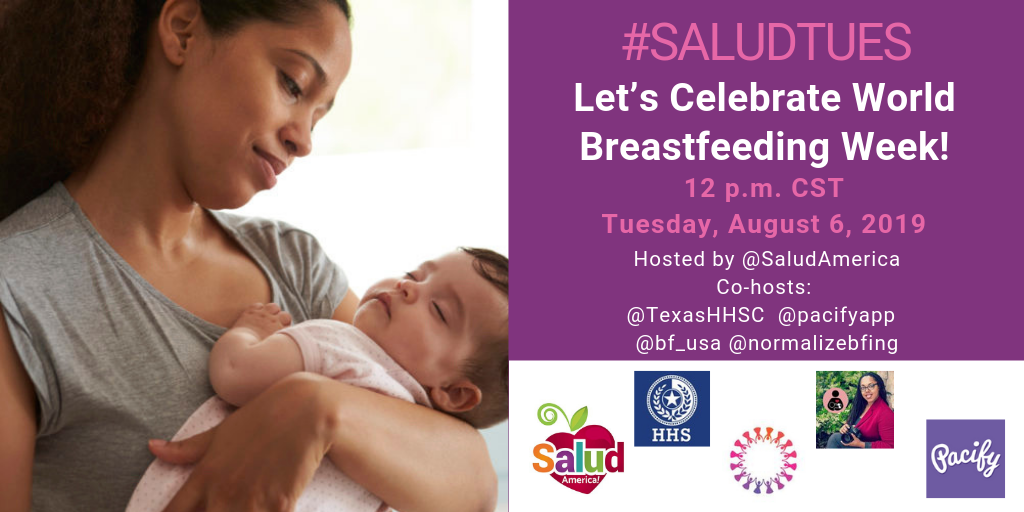
Share On Social!
You’ve probably heard of the many health benefits of breastfeeding, but did you know that promoting equity in breastfeeding can be just as important?
For many women and babies of color breastfeeding could mean a matter of life and death or sickness and health.
Breastfeeding also offers economic benefits.
Unfortunately, many mothers face barriers to breastfeeding.
Breastfeeding in the Latino Community
 Although 77% Latina mothers start off breastfeeding, this number drops to 21%, 6 months after giving birth.
Although 77% Latina mothers start off breastfeeding, this number drops to 21%, 6 months after giving birth.
One of the most common reasons for why women stop breastfeeding is the need to return to work or school. Some women may lack support from their family and peers.
Many Latina mothers are also faced with a lack of breastfeeding support from health care providers, and often become the victims of targeted marketing from formula companies, according to a 2016 research review from Salud America! and research from the UConn Rudd Center for Food Policy and Obesity.
Why Equity in Breastfeeding Matters
Have you ever considered how the environment can influence breastfeeding practices?
Many Latina mothers lack paid maternity leave, and simply can’t afford to not work.
Others lose their job as a result of having to take time off work to care for their newborn.
Upon returning to the workplace mothers often lack adequate support to pump milk for their child.
According to research, breastfeeding is associated with lower rates of sudden infant death syndrome (SIDS), diabetes, and asthma in children.
Mothers also experience a number of health benefits including a lower risk of type II diabetes, cardiometabolic disease, and even many cancers including breast cancer, endometrial, and ovarian cancer.
Examples of Policies That Promote Breastfeeding
 Despite the great things already happening in realm of breastfeeding advocacy, much work remains to be done.
Despite the great things already happening in realm of breastfeeding advocacy, much work remains to be done.
The good news is that many leaders are working to change this by supporting policies that promote equity in breastfeeding.
For instance, a new law in Washington now protects and expands a working mother’s right to pump breastmilk while at work, for up to 2 years. The law also requires employers to offer this protection to both hourly and salaried employees and to provide a designated space for women to pump other than a bathroom.
The following policies are a few examples of ways to support breastfeeding among all mothers:
- Increase the Number of Baby Friendly Hospitals
- Improve Access to Peer Breastfeeding Support
- Create Work Environments Supportive of Breastfeeding
- Establish Early Childcare Centers Supportive of Breastfeeding
Additionally, the use of evidence based advocacy is cited as a being critical for supporting breastfeeding among vulnerable populations.
Join #SaludTues This World Breastfeeding Week (#WABA2019)
 The World Alliance for Breastfeeding Action (WABA) is a global network of individuals and organizations who work to protect, promote, and support breastfeeding worldwide.
The World Alliance for Breastfeeding Action (WABA) is a global network of individuals and organizations who work to protect, promote, and support breastfeeding worldwide.
Each year, during the first week of August (1-6) they organize World Breastfeeding Week along with several other partners. The campaign is strategically aligned with the United Nation’s Sustainable Development Goals (SDGs), in order to highlight the importance of breastfeeding as a pillar of sustainable development.
This year’s #WABA2019 theme is: Empower Parents, Enable Breastfeeding.
How can you get involved? Join us for a #SaludTues chat, at 1pm EST on 8/6/19, in support of world breastfeeding week to learn more and take the WABA pledge to support breastfeeding.
Additional Resources to Promote Equity in Breastfeeding
- Learn more about the Baby Friendly Hospital Initiative from Changelab Solutions
- Access a factsheet on “Changing the System to Address Racial Inequities in Breastfeeding” here.
- Research: 9 Approaches to Breastfeeding Equity used in a National Breastfeeding Initiative
- Research: How Organizational and Managerial Support for Breastfeeding Improves Job Satisfaction
- Policy & Research: Model Maternity Policy Supportive of Breastfeeding
Explore More:
Healthy Families & SchoolsBy The Numbers
142
Percent
Expected rise in Latino cancer cases in coming years



